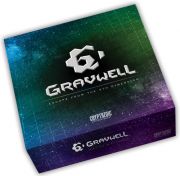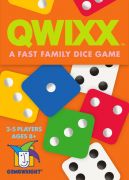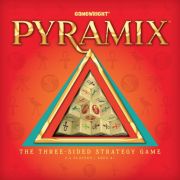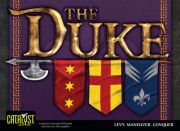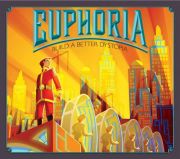Gravwell (published by Cryptozoic Entertainment, designed by Corey Young) – Players fly spaceships that have been shot through a wormhole and find themselves in a new dimension where physics and gravity work in a whole new way. In this dimension, ships move toward the nearest object, which will often be other ships. Players are all trying to be the first to reach the warp gate. Fuel cards are used to determine order of movement and direction (most cards move ships toward the nearest object, though a few move you further away). During each phase, players choose a card, which are all then revealed simultaneously. With your ship’s tendency to fly toward the nearest object and your opponents moving in unexpected directions, you can easily find your ship zooming off somewhere you hadn’t planned.
2014 Mensa Select Winners

This year's Mensa Mind Games event was held in Austin, TX. There were 56 competing games, 250 judges, and 44 hours of gaming, which all culminated in five winners being chosen to win the Mensa Select awards.
2014 Mensa Select Winners:
Qwixx (published by Gamewright, desined by Steffen Benndorf) – A quick fifteen minute game for 2 to 4 players which keeps everyone involved during every turn. Players are each given a score sheet that lists four rows of color-coded numbers. Players attempt to mark off numbers from their score sheet and score the highest number of points. Each turn, a player rolls two white dice and four colored dice. Players may choose to mark off different numbers based on the numbers on the dice and whether they are the player who rolled. However, numbers can only be marked off if they are listed to the right of previously marked-off numbers on your score sheet. Consequently, players have to make strategic decisions and take risks when choosing which numbers they want to mark off.
Pyramix (published by Gamewright, designed by Tim Roediger) – Players remove cubes from the pyramid, one at a time, scoring points based on the cubes' symbols and trying to avoid the cobra cubes. However, not all cubes can be removed. A cube must have two or three sides exposed, and must not be next to a cobra cube, in order for a player to take it. Removing a cobra cubes scores a player zero points, but sometimes it's the only option.
The Duke (published by Catalyst Game Labs, designed by Jeremy Holcomb and Stephen McLaughlin) – A two-player strategy game in which each player's forces are represented by sixteen double-sided tiles. Each side of a tile shows what that piece can do during its turn, such as move, jump, slide or strike. Opponent pieces are captured by ending your movement on their space. At the end of moving, tiles are flipped over to show a different set of movement options. The first player to capture their opponent's duke wins the game.
Euphoria: Build a Better Dystopia (published by Stonemaier Games, designed by Jamey Stegmaier and Alan Stone) – A worker-placement game in which players try to create the perfect dystopia through alliances, construction, land grabbing, and artifact gathering. Players use dice to represent their workers. The number on the die represents that worker's knowledge and how aware he is of the dystopia. While knowledge can give you bonuses, too much knowledge can lead your workers to desert your society. Accomplish goals (or trick your opponents into accomplishing them for you) to recruit special workers, all while trying build the perfect dystopia.




